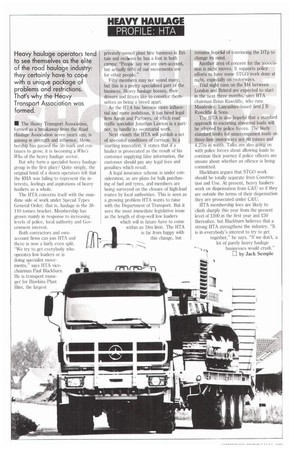Heavy haulage operators tend to see themselves as the elite
Page 46

If you've noticed an error in this article please click here to report it so we can fix it.
of the road haulage industry: they certainly have to cope with a unique package of problems and restrictions. That's why the Heavy Transport Association was formed.
• The Heavy Transport Association, formed as a breakaway from the Road Haulage Association seven years ago, is gaining in strength and influence. Membership has passed the 50 mark and continues to grow; it is becoming a Who's Who of the heavy haulage sector.
But why form a specialist heavy haulage group in the first place? Quite simply, the original band of a dozen operators felt that the RHA was failing to represent the interests, feelings and aspirations of heavy hauliers as a whole.
The HTA concerns itself with the mundane side of work under Special Types General Order; that is, haulage in the 38110 tonnes bracket. Membership has grown mainly in response to increasing levels of police, local authority and Government interest.
Both contractors and own account firms can join HTA and there is now a fairly even split. We try to get everybody who operates low loaders or is doing specialist move ments," says IITA vicechairman Paul Blackburn. Ile is transport manager for Hawkins Plant Hire, the largest privately owned plant hire business in Brithin and reckons he has a foot in both camps: "People say we are own-account, but actually 60% of our movements are for other people."
Fifty members may not sound many, but this is a pretty specialised part of the business. Heavy haulage bosses, their drivers and fitters like to consider themselves as being a breed apart.
As the HTA has become more influential and more ambitious, it has hired legal firm Aaron and Partners, of which road traffic specialist Jonathan Lawton is a partner, to handle its secretarial work.
Next month the HTA will publish a Set of specialist conditions of carriage. In a startling innovation, it states that if a haulier is prosecuted as the result of his customer supplying false information, the customer should pay any legal fees and penalties which result.
A legal insurance scheme is under consideration, as are plans for bulk purchasing of fuel and tyres, and members are being surveyed on the closure of high-load routes by local authorities. This is seen as a growing problem HTA wants to raise with the Department of Transport. But it sees the most immediate legislative issue as the length of drop-well low loaders which will in future have to come within an 18m limit. The HTA is far from happy with this change, but remains hopeful of convincing the DTp to change its mind.
Another area of concern for the association is night moves. It supports police efforts to have some STGO work done at night, especially on motorways.
Trial nightruns on the M4 between London and Bristol are expected to start in the next three months, says HTA chairman Brian Rawcliffe, who runs Maudesley, Lancashire-based firm J B Rawcliffe & Sons.
The HTA is also hopeful that a standard approach to escorting abnormal loads will be adopted by police forces. The likely standard limits for unaccompanied loads on three-lane motorways are 80 tonnes and 4.27m in width. Talks are also going on with police forces about allowing loads to continue their journey if police officers are unsure about whether an offence is being committed.
Blackburn argues that STGO work should be totally separate from Construction and Use. At present, heavy hauliers work on dispensation from C&U so if they are outside the terms of their dispensation they are prosecuted under C&U.
HTA membership fees are likely to climb sharply this year from the present level of £100 in the first year and 250 thereafter, but Blackburn believes that a strong HTA strengthens the industry. "It is in everybody's interest to try to get together," he says. "If we don't, a lot of purely heavy haulage businesses would crash."
fl by Jack Semple




















































































































